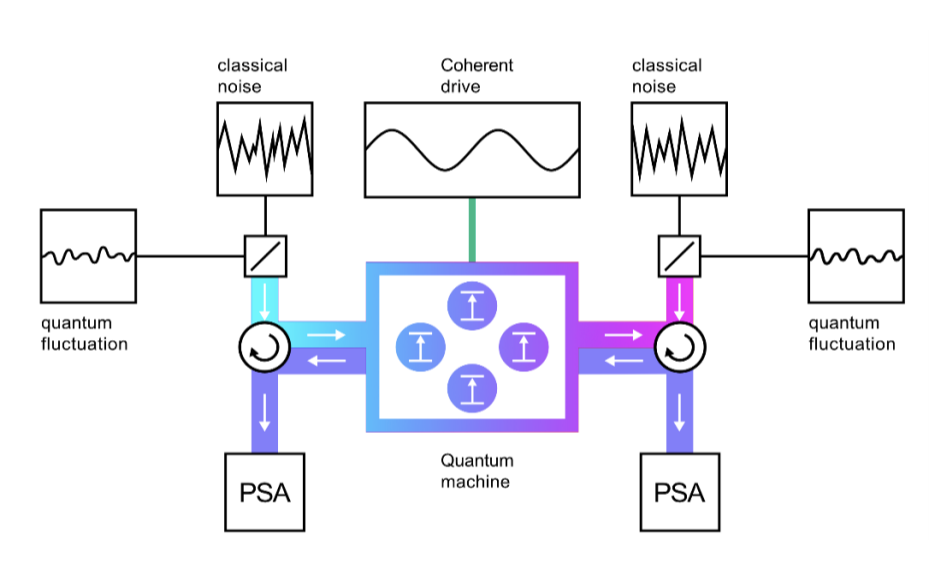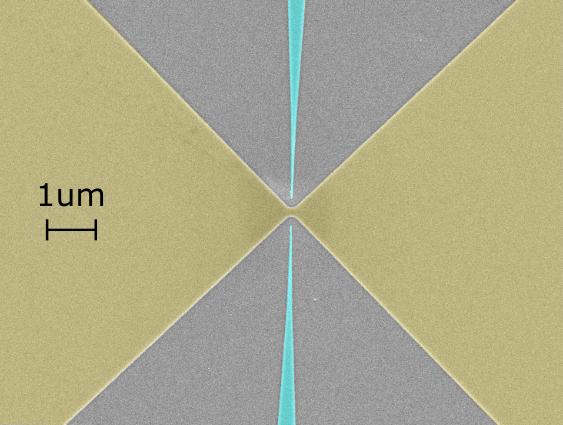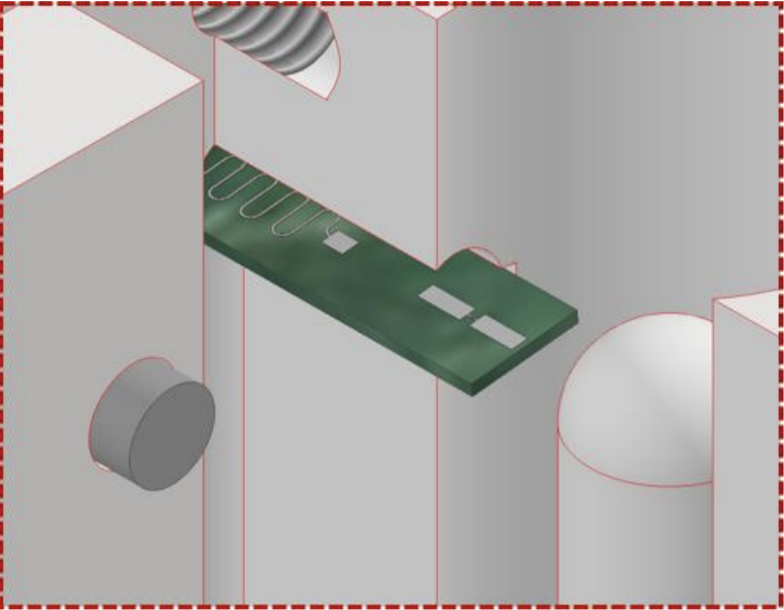Quantum Thermodynamics

The interplay between thermodynamics and quantum mechanics raises fundamental questions concerning the nature of energy, irreversibility, and information at the microscopic scale. At 202Q-lab, the quantum thermodynamics team investigates these questions by leveraging the architecture of circuit quantum electrodynamics (cQED), a platform that combines high-fidelity quantum control with the ability to engineer and characterize thermal environments.
Our research focuses on the experimental realization and analysis of quantum thermal machines, autonomous timekeeping devices, and microwave photodetectors. These systems serve as probes for understanding the thermodynamic behavior of quantum systems subject to dissipation, decoherence, and measurement. Particular emphasis is placed on identifying conditions under which quantum coherence, entanglement, or measurement backaction can be operationally linked to thermodynamic performance—both as resources and constraints. By integrating techniques from quantum information, mesoscopic physics, and open quantum systems, the group aims to establish a scalable and reproducible experimental framework for quantum thermodynamic studies.
Why Quantum Thermodynamics?
Classical thermodynamics, while developed for macroscopic systems, must be reformulated at the scale of individual quantum systems, where continuity, determinism, and negligible fluctuations no longer apply. Quantum thermodynamics addresses this regime, integrating tools from statistical mechanics, fluctuation theorems, and quantum information theory.
Key questions include whether quantum systems can exhibit thermodynamic advantages, how to define nonclassical signatures in thermal machines, and how these effects scale with system complexity. At 202Q-lab, we pursue these questions through experimentally controlled superconducting circuits, aiming for systematic, high-precision investigations beyond proof-of-concept implementations.
The Research
The quantum thermodynamics team works across multiple interconnected themes. Their experiments are unified by the use of superconducting quantum circuits, designed and fabricated to allow detailed control of quantum systems in contact with engineered thermal environments. Current research centers on five key directions:
- Quantum Heat Engines and RefrigeratorsThe team at 202Q-lab has developed the first quantum refrigerator powered by engineered noise and demonstrated state-of-the-art detection of ultra-small heat currents at the attowatt scale. In parallel, the team realized the first practically useful quantum thermal machine: an absorption refrigerator that autonomously resets a superconducting qubit by harnessing a synergy of quantum and thermodynamic resources.
Papers:
- Quantum refrigeration powered by noise in a superconducting circuit, arXiv:2403.03373 (2024)
- Thermally driven quantum refrigerator autonomously resets superconducting qubit. Nature Physics 21, 318 (2025)
- Thermodynamic Precision Advantage202Q-lab is exploring whether quantum systems can outperform classical limits on precision in nanoscale heat engines. Led by Simon Sundelin, this research investigates the possibility of surpassing the thermodynamic uncertainty relation, which defines a fundamental trade-off between power, fluctuations, and entropy production. Demonstrating such a quantum advantage would be a clear sign that quantum coherence can enhance engine performance in ways classical physics cannot. (Ongoing)
- Single-Photon Detection at Microwave FrequenciesDetecting single microwave photons remains a major hurdle due to their extremely low energy. Under Vyom Manish Kulkarni’s lead, 202Q-lab is developing real-time microwave photodetectors by catching individual photons and transferring them into the dark state of an engineered quantum system (an artificial diatomic molecule) where quantum jumps act as “clicks.” This approach opens new pathways for high-efficiency photon detection in the microwave regime. (Ongoing)
- Autonomous Quantum ClocksTimekeeping at the quantum level comes with a thermodynamic price. Led by Ludvig Nordqvist, 202Q-lab investigates how entropy production limits clock precision and how quantum coherence and thermal resources might be used to build fully autonomous quantum clocks. The goal is to push beyond classical performance by turning thermodynamic constraints into quantum design tools. (Ongoing)
- Fluxoniums in ThermodynamicsFluxonium qubits, unlike standard Transmons, can undergo transitions between non-neighboring energy levels, offering greater flexibility in how they interact with thermal environments. Saba Kheviashvili is leveraging this property to design and study quantum thermal machines that would be difficult to realize with conventional qubits. This work opens up new directions in quantum thermodynamic engineering. (Ongoing)
The Team Behind the Science
The group is composed of tightly collaborating PhD researchers, each driving one of the main project lines:
- Aamir Ali (Permanent researcher) leads quantum thermodynamics research at 202Q-lab and laid the foundation for the lab’s program, including the autonomous quantum refrigerator.
- Simon Sundelin (PhD student) spearheads research on thermodynamic uncertainty relations and quantum precision limits, while also contributing broadly across multiple projects in quantum thermodynamics.
- Vyom Kulkarni (PhD student) leads the development of single-photon detectors and related quantum circuit architectures in the microwave regime.
- Ludvig Nordqvist (PhD student) focuses on autonomous quantum clocks, investigating timekeeping through the lens of quantum coherence and thermodynamic cost.
- Saba Kheviashvili (Master’s student) studies fluxonium-based systems for next-generation thermal machines.
The team shares tools, infrastructure, and methods, but each member carves out deep expertise in their chosen area.
Collaborations
The lab’s work benefits from being part of the ASPECTS European consortium, which brings together leading theory and experiment groups in quantum thermodynamics from across Europe. Collaborations within Chalmers, both inside 202Q-lab and with other departments, keep ideas moving quickly and provide access to world-class fabrication facilities and theoretical support.
International partnerships, especially with teams in Milan and Paris, are also central. These connections strengthen both experimental planning and theoretical interpretation, linking the lab’s local device development to the wider global research effort
Opportunities in the 202Q-lab
Quantum thermodynamics is a challenging yet deeply rewarding field. 202Q-lab welcomes motivated Master’s students, depending on available supervision and how well the project fits with ongoing work. We’re looking for students with a solid background in physics, a genuine interest in fundamental questions, and a willingness to get hands-on with quantum experiments.
Related publications
Quantum refrigeration powered by noise in a superconducting circuit
Nature Communications 17, 359 (2026)
Simon Sundelin, Mohammed Ali Aamir, Vyom Manish Kulkarni, Claudia Castillo-Moreno, Simone Gasparinetti
Precision is not limited by the second law of thermodynamics
Nature Physics 21, 1147 (2025)
Florian Meier, Yuri Minoguchi, Simon Sundelin, Tony J. G. Apollaro, Paul Erker, Simone Gasparinetti, Marcus Huber
Thermally driven quantum refrigerator autonomously resets superconducting qubit
Nature Physics 21, 318 (2025)
Mohammed Ali Aamir, Paul Jamet Suria, José Antonio Marín Guzmán, Claudia Castillo-Moreno, Jeffrey M. Epstein, Nicole Yunger Halpern, Simone Gasparinetti
Engineering symmetry-selective couplings of a superconducting artificial molecule to microwave waveguides
Mohammed Ali Aamir, Claudia Castillo Moreno, Simon Sundelin, Janka Biznárová, Marco Scigliuzzo, Kowshik Erappaji Patel, Amr Osman, D. P. Lozano, Simone Gasparinetti
Physical Review Letters 129, 123604 (2022)
Nonequilibrium heat transport and work with a single artificial atom coupled to a waveguide: emission without external driving
Yong Lu, Neill Lambert, Anton Frisk Kockum, Ken Funo, Andreas Bengtsson, Simone Gasparinetti, Franco Nori, Per Delsing
PRX Quantum 3, 020305 (2022)
Primary Thermometry of Propagating Microwaves in the Quantum Regime
Marco Scigliuzzo, Andreas Bengtsson, Jean-Claude Besse, Andreas Wallraff, Per Delsing, Simone Gasparinetti
Physical Review X 10, 041054 (2020)



